
SLAVONIC AND EAST EUROPEAN REVIEW
Scope & Guideline
Illuminating the Complex Narratives of the Slavic World
Introduction
Aims and Scopes
- Historical Analysis:
The journal focuses on historical narratives and critical analyses of events across Eastern Europe, from imperial histories to the impacts of the Cold War and post-Soviet transitions. - Cultural Studies:
It explores the cultural dimensions of Eastern European societies, including literature, art, music, and their socio-political contexts, emphasizing the interplay between culture and identity. - Political Discourse:
The journal examines political movements, ideologies, and governance structures in Eastern Europe, scrutinizing both historical and contemporary political phenomena. - Transnational Perspectives:
There is a strong emphasis on transnational studies, investigating how historical processes in Eastern Europe intersect with global trends, including migration, nationalism, and cultural exchange. - Social Dynamics and Identity:
The journal addresses social structures, ethnic identities, and the dynamics of power in Eastern European societies, including issues of gender, class, and race.
Trending and Emerging
- Political Martyrdom and Resistance:
A notable trend is the exploration of political martyrdom, particularly in the context of revolutionary movements and dissidence in Russia and other Eastern European countries, highlighting the role of individual narratives in broader political resistance. - Cultural Memory and Identity:
There is an increasing focus on cultural memory, identity formation, and the legacies of historical events, particularly in relation to the Soviet past and national identities in post-Soviet states. - Environmental Studies:
Emerging themes include environmental history and the impact of climate change, reflecting a growing recognition of environmental issues in the context of Eastern European studies. - Transnational Migration and Diaspora Studies:
Research on migration patterns and the experiences of diasporas is gaining traction, emphasizing the interconnectedness of Eastern Europe with global migration trends. - Digital Humanities and New Methodologies:
The integration of digital humanities in research methodologies is becoming more prominent, with scholars employing new technologies to analyze texts and historical data.
Declining or Waning
- Traditional National Histories:
There seems to be a decline in articles focusing solely on traditional national histories without integrating broader transnational or comparative perspectives. - Soviet Era Nostalgia:
The romanticized narratives of the Soviet past are becoming less prominent, as contemporary scholarship increasingly critiques this period with a focus on its complexities and contradictions. - Exclusively Literary Studies:
While literature remains a core subject, the focus on purely literary studies without connecting to cultural or historical contexts appears to be waning, as interdisciplinary approaches gain prominence. - Cold War Dichotomies:
Research that strictly adheres to Cold War binaries (East vs. West) is declining, with a shift towards more nuanced understandings of the period's complexities. - Ethnic Conflicts without Broader Contexts:
The journal has seen a decrease in articles that examine ethnic conflicts in isolation, reflecting a broader trend towards understanding these issues within global and historical frameworks.
Similar Journals

East Central Europe
Bridging Past and Present in Cultural StudiesEast Central Europe is a prestigious scholarly journal published by BRILL that focuses on the intricate historical and cultural landscapes of the East Central European region. Established in 1975, this journal has become a pivotal platform for scholars, professionals, and students engaged in the fields of Cultural Studies, History, and Sociology and Political Science. With its comprehensive scope that spans significant historical periods and contemporary issues, East Central Europe aims to foster a deeper understanding of the socio-political dynamics and cultural developments that define this diverse area. Although not open access, the journal maintains a respectable impact within its category, ranking Q3 in both Cultural Studies and History, highlighting its relevance and reach within the academic community. Researchers interested in deepening their insights into regional studies will find this journal an invaluable resource, reflecting its solid position within the academic hierarchy, as evidenced by its ranking in Scopus. Further information and submission details can be accessed through BRILL's official website.
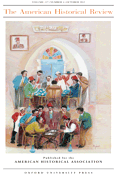
AMERICAN HISTORICAL REVIEW
Illuminating the Past, Inspiring the FutureAMERICAN HISTORICAL REVIEW, published by Oxford University Press, stands as a premier journal in the field of history, representing a vital resource for researchers, academics, and students alike. With an impressive Q1 ranking in History and a robust track record in museology and archaeology, the journal is committed to advancing scholarly discussions and disseminating groundbreaking research that shapes our understanding of the past. While the journal is not open access, it remains highly respected, featured prominently in leading academic databases and boasting a significant impact on the humanities and social sciences. Its extensive coverage of historical periods—from 1970 through the present—ensures a comprehensive exploration of diverse historical narratives. The AMERICAN HISTORICAL REVIEW continues to foster intellectual engagement and diversity in historical discourse, making it essential reading for anyone keen on historical research and knowledge.
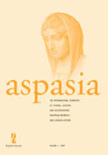
Aspasia
Empowering voices in the study of gender and history.Aspasia is a distinguished open-access journal dedicated to the fields of Gender Studies and History, published by BERGHAHN JOURNALS and based in the United Kingdom. Since its inaugural issue in 2011 and achieving open access in 2019, Aspasia has committed to providing a platform that explores diverse scholarly perspectives on women's experiences and gender dynamics within historical contexts. With an impact factor reflective of its rigorous peer-review process, Aspasia has achieved notable rankings, including Q4 in Gender Studies and Q3 in History for 2023, indicating its growing influence within these disciplines. The journal is indexed in prominent databases, showcasing its relevance and contribution to ongoing academic discourse. Researchers, professionals, and students are encouraged to explore its rich content, fostering critical dialogue and advancing knowledge in the understanding of gender and historical narratives.
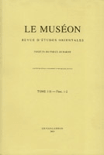
Museon
Bridging Disciplines for a Deeper UnderstandingMuseon, published by PEETERS in Belgium, is a prominent academic journal dedicated to exploring the interconnected realms of History, Linguistics, Literature, and Religious Studies. With an ISSN of 0771-6494 and an E-ISSN of 1783-158X, this journal has been a reliable source of scholarly discourse since its inception in 1972, with coverage extending from 1976 to 2023. While the journal does not offer open access, it maintains a respectable reputation, as evidenced by its category quartile rankings in 2023, positioning it in Q2 for Literature and Literary Theory and Q3 for the other disciplines. Researchers and students in these fields will find Museon to be an essential platform for disseminating and engaging with innovative and critical analyses. The journal's commitment to high-quality scholarship is reflected in its diverse scope and its ongoing contribution to the humanities, making it a vital resource for advancing knowledge and fostering academic dialogue.
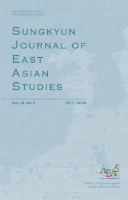
Sungkyun Journal of East Asian Studies
Illuminating Contemporary Issues in East Asian StudiesSungkyun Journal of East Asian Studies, published by the ACAD EAST ASIAN STUD, SUNGKYUNKWAN UNIVERSITY, is a premier open-access journal dedicated to the exploration and analysis of East Asian cultures, histories, and societies. Since its establishment in 2010, this journal has rapidly gained recognition, currently holding a notable impact across various disciplines, including Anthropology, Cultural Studies, Literature, Religious Studies, Sociology, and Political Science. As of 2023, it is classified in quartiles Q4 in Anthropology and Sociology, and Q3 in Cultural Studies and Religious Studies, highlighting its growing influence and relevance in contemporary research. Researchers and scholars can take full advantage of its open-access model introduced in 2021, ensuring broad dissemination of knowledge and fostering an inclusive academic discourse. The journal aims to facilitate interdisciplinary dialogue and critical insights into East Asian issues, making it an invaluable resource for students, professionals, and academics seeking to deepen their understanding of this dynamic region.
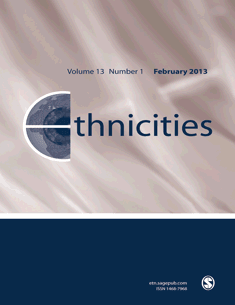
Ethnicities
Fostering Critical Discourse in Ethnic StudiesEthnicities is a leading academic journal published by SAGE Publications Ltd, dedicated to exploring the complex dynamics of ethnicity, cultural identity, and social interactions within diverse communities. Since its inception in 2001, the journal has established a reputable position in the field of Cultural Studies, evidenced by its impressive Q1 ranking in the Cultural Studies category and Q2 ranking in Arts and Humanities (miscellaneous) as of 2023. With a Scopus ranking that places it in the top 8% of journals in Cultural Studies, Ethnicities aims to facilitate critical discourse, innovative research, and scholarly exchange related to ethnicity across global contexts. Researchers, professionals, and students interested in investigating the intricate intersections of race, identity, and social policy will find valuable insights within its pages. For further engagement and access to its comprehensive articles, the journal is available without Open Access options, serving as a vital resource for understanding contemporary issues in ethnicity and cultural relations.

STUDIES IN EAST EUROPEAN THOUGHT
Navigating the Intricacies of Eastern Europe's Intellectual LandscapeSTUDIES IN EAST EUROPEAN THOUGHT is a premier academic journal published by Springer, focusing on the multifaceted intellectual heritage and cultural dynamics of Eastern Europe. Established in 1993, this journal has been a significant platform for scholarly discourse, promoting interdisciplinary research across the fields of Cultural Studies, Law, Literature, Philosophy, and Social Sciences. With an impressive impact reflected in its Scopus rankings, including a Q1 categorization in Literature and Literary Theory and a Q2 standing in Cultural Studies and Law, it remains at the forefront of academic research, contributing to the global understanding of Eastern European perspectives. The journal is available in both print (ISSN: 0925-9392) and electronic (E-ISSN: 1573-0948) formats, with a committed audience of researchers, professionals, and students eager to explore the intricacies of Eastern European thought. By engaging with diverse methodologies and contemporary issues, STUDIES IN EAST EUROPEAN THOUGHT continues to shape the academic landscape and elevate scholarly discussions surrounding this vibrant region.
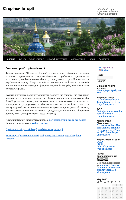
Storinky Istoriyi-History Pages
Exploring the Threads of History.Storinky Istoriyi-History Pages, published by the NATL TECHNICAL UNIV UKRAINE IHOR SIKORSKY KYIV POLYTECHNIC INST, is a prestigious academic journal dedicated to the exploration and analysis of historical narratives and their significance in contemporary contexts. With an ISSN of 2307-5244 and E-ISSN 2411-0647, the journal has embraced an Open Access model since 2012, facilitating wider dissemination of knowledge and encouraging scholarly dialogue among researchers, professionals, and students interested in history and its multifaceted impacts. Based in Kyiv, Ukraine, this journal serves as an essential platform for the publication of innovative research, critical reviews, and insightful articles that contribute to the ongoing academic discourse in historical studies. Although specific metrics such as H-index and Scopus rankings are currently unavailable, the journal is poised to enhance the visibility and impact of historical research on an international level, making it a valuable resource for those dedicated to understanding and interpreting the past.
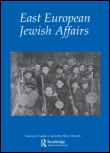
East European Jewish Affairs
Advancing Scholarly Discourse on Jewish Affairs in Eastern EuropeEast European Jewish Affairs is a prominent scholarly journal published by Routledge Journals, Taylor & Francis Ltd, dedicated to exploring the intricate historical, cultural, and political dynamics of Jewish communities in Eastern Europe. With ISSN 1350-1674 and E-ISSN 1743-971X, this journal has been a critical platform for academic discourse since its inception in 1992, resuming publication after a hiatus in 2005. Although it is not an open-access journal, it provides vital insights into Jewish studies, engaging researchers, professionals, and students alike with in-depth analyses and discussions. The journal currently holds a Q4 ranking in multiple categories, including Cultural Studies, History, and Political Science and International Relations, reflecting its niche yet significant contribution to these fields. The 2023 Scopus rankings position it within the 34th percentile in History and the 10th percentile in Political Science, evidencing its specialized focus and the evolving nature of Jewish studies. For those investigating the unique social and cultural trajectories of East European Jewish communities, East European Jewish Affairs serves as an essential resource.

Comparative Southeast European Studies
Fostering Insights into Southeast Europe's Multidimensional LandscapeComparative Southeast European Studies, published by WALTER DE GRUYTER GMBH, is an esteemed open-access journal that has been contributing to scholarly discourse since its inception in 2021. With its ISSN 2701-8199 and E-ISSN 2701-8202, the journal is dedicated to the multidisciplinary examination of Southeast European societies, cultures, and economies. The journal strives to foster a nuanced understanding of historical and contemporary issues through an array of perspectives, appealing to researchers, professionals, and students alike. While it currently resides in Q4 for several categories including Anthropology, Economics, and Political Science, it maintains a robust platform for innovative research and dialogue within the region. Situated in Germany, this journal serves not only as a repository of knowledge but also as a catalyst for future scholarly endeavors, with the aim to elevate the discourse surrounding Southeast Europe during the converging years of 2021 to 2024. Its commitment to open access ensures that critical research is readily available, inspiring collaboration and engagement across academic and professional communities.